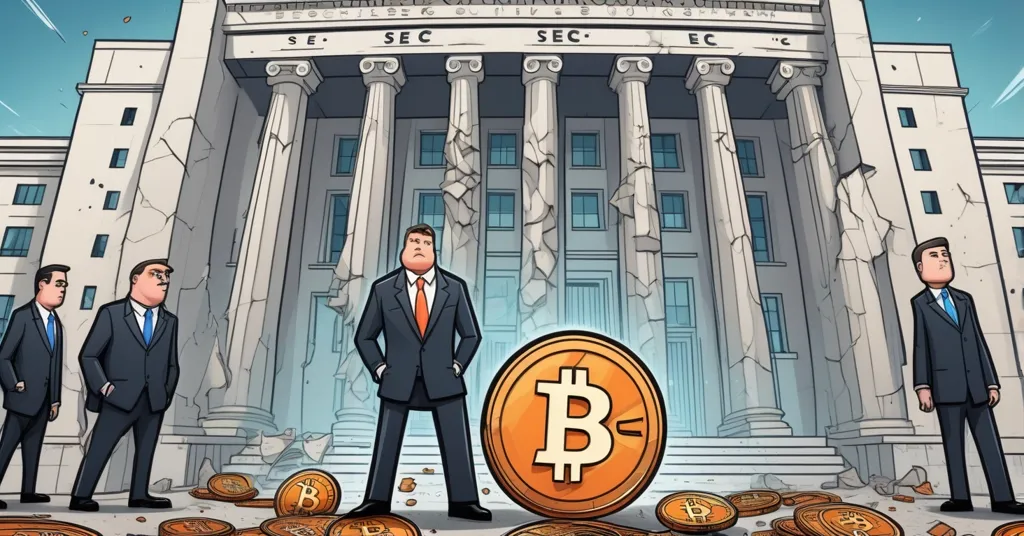SEC Eases Crypto Crackdown in 2025, But Hester Peirce Warns: No Bailouts

SEC Pulls Back on Crypto Crackdown, But Don’t Expect a Bailout
The U.S. Securities and Exchange Commission (SEC) is loosening its iron grip on the crypto industry, dropping lawsuits against giants like Coinbase, Uniswap, and OpenSea. Yet, at the Bitcoin 2025 conference in Las Vegas, SEC Commissioner Hester Peirce—widely known as “Crypto Mom” for her industry-friendly views—delivered a stark warning: don’t come begging for a government bailout when your investments implode.
- SEC drops high-profile lawsuits, signaling a regulatory shift under new leadership.
- Hester Peirce pushes personal accountability, rejecting bailout expectations for crypto investors.
- Most cryptocurrencies may not be securities, potentially easing burdens on trading platforms.
A Regulatory Pivot: SEC Steps Back from Enforcement Overreach
For years, the SEC under former Chair Gary Gensler wielded a sledgehammer against the crypto sector, labeling many digital assets as securities and pursuing aggressive enforcement actions. Cases like the ongoing Ripple lawsuit, where the SEC claimed XRP was an unregistered security, became symbols of an approach many decried as suffocating innovation. Businesses faced legal uncertainty, with some fleeing to crypto-friendly havens like Switzerland or Singapore. But the tide has turned. Under new Trump-appointed leadership, the SEC has dismissed civil actions against major players—Coinbase (a leading cryptocurrency exchange), Uniswap (a decentralized finance protocol for peer-to-peer trading), and OpenSea (a prominent marketplace for NFTs, or non-fungible tokens, which are unique digital assets on the blockchain). This isn’t a random act of mercy; it’s tied to the formation of a dedicated Crypto Task Force in January 2025, designed to shift focus from litigation to crafting transparent rules, as confirmed by recent SEC announcements.
Acting Chairman Mark T. Uyeda underscored this change, stating that it’s time for the agency to “rectify its approach and develop crypto policy in a more transparent manner.” This pivot suggests a move away from the “regulation through enforcement” model Peirce herself criticized as a creativity-killer. Instead, the SEC is narrowing its sights on clear violations and outright fraud—think Ponzi schemes disguised as token sales or rug pulls, where developers hype a project, collect funds, and disappear overnight. As Peirce emphasized during her Bitcoin 2025 conference speech:
“It’s certainly not to say that there will not be enforcement. There’s a lot of bad activity, as we all know, that’s perpetrated in the name of crypto.”
She’s spot on. The crypto frontier brims with innovation, but it’s also a cesspool for scammers. Fake Initial Coin Offerings (ICOs, fundraising events where projects sell new tokens) and shady exchanges have burned countless investors. Refocusing on these bad actors while giving legitimate projects breathing room could be the balance the industry has craved.
Securities or Not? Unpacking Crypto Classification
One of the most significant revelations from Peirce’s talk was her take on what constitutes a security under SEC jurisdiction. For the unversed, a security—per the Howey Test set by the Supreme Court—involves an investment where you expect profits from someone else’s efforts. Think stocks or bonds. Peirce argued that most cryptocurrencies likely don’t fit this bill, meaning many trading platforms might not need to register with the SEC unless they’re explicitly handling securities. This could be a lifeline for exchanges and DeFi (decentralized finance) platforms that have dreaded the crushing cost of compliance, as discussed in community opinions on whether most cryptocurrencies are securities.
Digging deeper, Peirce hinted at a nuanced standard: assets without “indicia of external control or dependency” might be permanently excluded from SEC oversight. Compare Bitcoin, a decentralized network with no central authority controlling its supply or direction, to a token where developers can arbitrarily mint more coins or dictate terms—that’s where the line blurs. Under the new leadership, exemptions are already being carved out for quirky sectors like memecoins (joke tokens like Dogecoin born from internet culture), certain stablecoins (tokens pegged to assets like the U.S. dollar for price stability), and some crypto mining operations (the energy-heavy process of validating transactions on networks like Bitcoin). If this trajectory holds, the regulatory net could shrink further, freeing up innovation in unexpected corners of the market.
No Safety Net: Peirce’s Uncompromising Call for Accountability
While the SEC’s lighter touch might feel like a victory lap for crypto enthusiasts, Peirce didn’t shy away from a harsh reality check. Addressing the often libertarian-leaning crowd at Bitcoin 2025, she called out the hypocrisy of those who preach freedom until their portfolio gets wrecked. Her words, echoed in discussions on Peirce’s crypto-friendly stance, were direct:
“I do think that sometimes, when something bad happens in this space, people who are remarkably free thinkers, libertarian-minded people, come in and say, ‘Where was the government? Why weren’t you protecting me? Hey, Crypto Mom, where’s my bailout?’”
She doubled down, urging investors to embrace the full weight of their choices—wins and losses alike. If your speculative bet on a dog-themed token flops, don’t expect Uncle Sam to wipe your tears, a sentiment reinforced by the SEC’s warning against bailout expectations. As she put it:
“Yes, you should have freedom to make your own choices. And when it goes wrong, pick yourself up, dust yourself off, learn from it and do better next time. And that is the best way to move forward.”
This tough-love stance strikes at a cultural contradiction in the crypto community. We champion decentralization and self-reliance, yet when a hack drains our wallet or a scam wipes us out, the knee-jerk reaction is to demand oversight. If we’re serious about disrupting centralized systems, we can’t cherry-pick freedom only when it suits us. Losses are the tuition for learning in this space.
That said, let’s play devil’s advocate for a moment. While personal accountability aligns with the ethos of blockchain, some argue that minimal guardrails—not bailouts—could shield vulnerable retail investors without undermining liberty. A basic fraud alert system or mandatory transparency for project teams might prevent catastrophic losses for newcomers who don’t yet know how to spot a scam. It’s a fine line between protection and overreach, and one worth debating as the industry matures.
Regulatory Gaps: A Patchwork System in Need of a Fix
Peirce was clear that the SEC’s authority isn’t a blanket solution. It covers securities-related fraud, but non-securities scams—like a hacked Bitcoin wallet or a fake NFT drop—often fall outside its reach. Other agencies step into the fray, like the Commodity Futures Trading Commission (CFTC), which oversees commodities such as Bitcoin and Ethereum (the second-largest blockchain, powering smart contracts—self-executing agreements coded on the network). Then there’s FinCEN, the Financial Crimes Enforcement Network, which focuses on anti-money laundering rules for crypto transactions, often enforcing Know Your Customer (KYC) requirements on wallets and exchanges. Despite these layers, gaps persist. A recent CFTC action on Bitcoin futures regulation shows their involvement, but coordination across agencies remains messy, a challenge often explored in broader overviews of U.S. crypto regulatory policies.
This fragmented landscape is why Peirce and others keep pointing to Congress for a comprehensive framework. The SEC can clarify what qualifies as a security, but regulating everyday retail trading—the buying and selling most of us do—requires federal legislation. Lawmakers have dawdled for years, leaving the U.S. crypto market in a gray zone. Without clear rules, investors navigate a minefield, and scammers exploit the chaos.
Global Competition and Emerging Frontiers
The stakes are higher when you zoom out globally. Peirce noted how murky U.S. regulations have pushed entrepreneurs to friendlier jurisdictions like Switzerland, home to “Crypto Valley” in Zug, where blockchain startups thrive under clear guidelines. Singapore, too, offers a progressive licensing framework that welcomes innovation without the legal quicksand. Meanwhile, America risks losing its edge in the blockchain race—a bitter irony for a nation that prides itself on leading tech revolutions, a perspective Peirce herself elaborated on in her remarks at recent industry events.
Then there’s the frontier of tokenization, the process of turning real-world assets like real estate or artwork into blockchain-based tokens for fractional ownership. Imagine buying a slice of a Manhattan skyscraper via Ethereum. Peirce flagged this as a nascent field with massive potential but also a regulatory nightmare if mishandled. A tokenized asset could blur the line between security and commodity, reigniting debates over jurisdiction. These trends underscore that while the SEC’s pivot is progress, it’s just one piece of a sprawling puzzle.
Bitcoin’s Edge and the Broader Crypto Ecosystem
As a Bitcoin maximalist, I see this regulatory shift as a vindication of Bitcoin’s resilience. Classified as a commodity under CFTC oversight, it largely sidesteps the SEC’s securities drama. Its fixed supply of 21 million coins and decentralized network make it a digital gold that’s hard to overregulate, unlike many altcoins with centralized control or murky tokenomics. Yet, I’m not dogmatic enough to ignore the value of other blockchains. Ethereum’s smart contracts fuel DeFi, enabling lending and borrowing without banks—niches Bitcoin isn’t designed for. Memecoins, as absurd as they seem, keep crypto culturally relevant, while stablecoins provide the stability traders need in a volatile market. Each has a role in this financial upheaval, even if some projects are more carnival bark than substance.
Still, let’s not drink the Kool-Aid of unbridled optimism. A softer SEC doesn’t mean the scams vanish; it means we must be sharper. Anyone peddling “guaranteed 10x gains by next quarter” is selling snake oil, not insight. Crypto isn’t a lottery ticket—it’s a paradigm shift with brutal risks. Spotting red flags, like a project with no whitepaper or an anonymous team, is on us. Peirce’s message wasn’t just policy; it was a gut check. Freedom in decentralized finance demands vigilance.
There’s also a flip side to reduced enforcement worth pondering. Could a lighter SEC hand embolden bad actors if robust alternatives—like better inter-agency coordination or community-driven fraud detection—aren’t in place? Less oversight might mean more responsibility for us, but it could also leave the door ajar for sophisticated scams targeting the unwary, a concern raised in reflections on the impact of SEC dropping lawsuits. It’s a gamble, and the house always has an edge if we’re not careful.
Key Questions on the SEC’s Evolving Crypto Stance
- Why Is the SEC Changing Its Crypto Regulation Approach in 2025?
Under Trump-appointed leadership, the SEC is moving away from heavy-handed enforcement, dropping lawsuits against firms like Coinbase and Uniswap, prioritizing fraud cases, and forming a Crypto Task Force to develop clear rules, as noted in recent SEC updates on dismissed cases. - What Does Hester Peirce Think of Past SEC Policies?
Peirce has slammed the “regulation through enforcement” tactic under Gary Gensler as a barrier to innovation, driving crypto businesses abroad due to legal uncertainty. - Are Most Cryptocurrencies Considered Securities by the SEC?
No, Peirce believes most crypto assets likely aren’t securities, potentially freeing many trading platforms from SEC registration unless they deal with clear securities. - Will the SEC Protect Crypto Investors from Losses?
Not a chance—Peirce explicitly rejected the idea of government bailouts, insisting investors must own their decisions and learn from failures. - What’s Needed for Clear U.S. Crypto Regulation?
Congressional legislation is critical to establish a federal framework for retail crypto trading, as the SEC’s authority is limited to securities and can’t address the entire market.
As the SEC redefines its boundaries, the onus falls on us to navigate this decentralized wild west with clear eyes. The promise of blockchain and Bitcoin as the future of money shines bright, but the shadows of risk and responsibility loom just as large. It’s not just about regulatory clarity—it’s about redefining how we engage with a system built on freedom, for better or worse.



